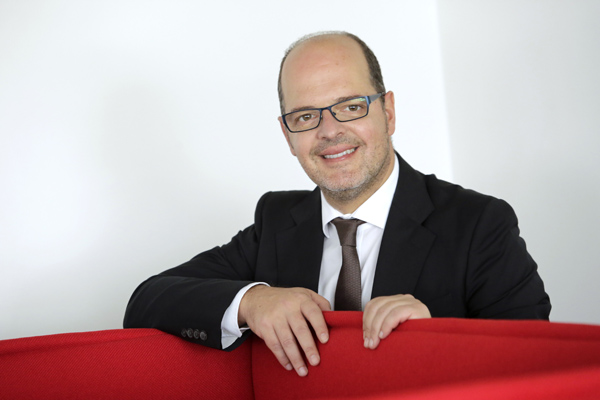Portuguese people who stand out abroad are helping to find out where business opportunities are and what kind of companies and activities the country can attract. An initiative that brings together Negócios and the Portuguese Diaspora Council.
1- What led you to leave Portugal?
The path I took as soon as I finished my management degree at ISEG quickly led me to a German multinational. From there, the journey continued: first, Barcelona, then a brief return to Portugal, more responsibilities and, finally, the departure for Mexico, already with another breath and professional reach. Let’s just say that this was the route of those first steps. It happened to me, it happens to other people who show this desire and appetite for getting to know new ways of doing things, other stopovers and new cultures. Leaving Portugal turned out to be a natural choice without any soul states. From a certain point onwards, the best opportunities for growth were actually outside our country. We don’t have that many global companies, so the offer that comes from abroad takes centre stage in the mind of a person under 30 who wants to build a solid and motivating career. In my case, there’s another ingredient: the fact that I accompanied my parents on several expatriations that they also experienced for professional reasons ended up making my departure process a moment of continuity and not an interruption of anything at all. Moving to Spain, Mexico, Chile and Brazil, although not in that order, was never a difficult choice I was forced to face, with my family always central to all these decisions. We never saw these invitations and opportunities as risky steps towards sudden and forced uprooting. It was exactly the opposite: we always knew that the connection to Portugal wouldn’t disappear, but would gain – in fact, it has gained – even contours that make this relationship paradoxically close. We have the Atlantic in our midst, but sometimes it feels like I’m in Lisbon.
2- What advantages or disadvantages did being Portuguese bring you?
It brought both, but they weren’t decisive. There were times, especially until I was in my 20s, when I felt a kind of patriotic grandiosity simply because I was Portuguese, although at the time, I’m talking about the 1980s, this hardly resonated outside our country. Being Portuguese didn’t matter much, it didn’t make an impression: we were entering the European Union and we were still going through a phase of democratic consolidation associated with tremendous economic and financial difficulties that were expressed at all levels. The contrast, for example, with Italy, where I was living at the time, was truly immense. A young person today has no idea of the gulf between these two worlds. At the time – and even today – I would have liked Portugal to be more recognised in the world and not just by the image projected by a few illustrious Portuguese. It’s a cliché, I know, but when we live abroad we end up loving our country even more, which gives us an extra incentive to assert ourselves professionally. A country that started out at a disadvantage, and a small one at that, demands – demands – that each of us makes an extra effort. I must emphasise that this is not to say that a kind of feeling of inferiority emerged. Not at all. Not least because in companies and at work everyone is worth what they are worth, worth what they really do.
3- What obstacles did you have to overcome and how did you do it?
I didn’t really face any major obstacles. As Portuguese, we quickly assimilate the communication codes of other cultures. We are excellent at adapting – another cliché I can confirm. On the other hand, I also didn’t feel that being Portuguese was in any way differentiating, not least because most people don’t associate Portugal with our history, which could clearly be an anchor. In fact, I almost always confirmed, with honourable exceptions, that there is a great lack of knowledge about who we are. It was easier to associate Portugal with emigrants in Switzerland or France. Today that image has been replaced by football. Portugal is more exposed, it generates more curiosity and even interest, but it still doesn’t project value. We still need to take that step. We have the universities, we have the people… but let’s just say that the average is low in almost everything compared to the countries we compete with. And since we lack internal scale and capital, everything becomes more difficult.
4- What do you admire most about the country you’re in?
I really like Mexico and Mexico City. This is the third time we’ve lived here. It’s a great city, with a strong and dynamic economy, very competitive, a thriving and very creative culture. On our first trip, we were young people with everything to do. Then we became adults with children and, naturally, other concerns. Today, with our children already leading their lives away from home, although still studying, and with the experience we’ve gained, everything has become easier and even more interesting. This is a country where culture is deeply rooted in customs. Education has been rigorous for generations, which can be surprising for those who don’t know it, but which opens up endless opportunities for us personally and professionally. Having lived in many countries, we’re sure that for all the reasons I’ve mentioned, Mexico is really, really unique. It’s a country where the Portuguese feel almost at home, with the advantage that the economy has scale and is right next to the United States, a powerful driving force.
5- What do you admire most about your company/organisation?
The modern world has shortened innovation cycles. Technology has taken on a leading role in differentiating companies. The pace of this modernisation is guided by a very demanding continuous process that keeps managers on their toes and encourages companies to invest and seek new paths at all times. Truly, there is no respite. However, I admire companies that not only master the technique, but also have a vision for the world, which makes all the difference because it gives a sense of purpose to the action, making it more robust. Sustainability, digital transformation, automation and the future of aviation are areas that Honeywell is leading and that are aligned precisely with this vision and worldview. It’s good to be part of this team and contribute to its definition, evolution and affirmation. Leading this effort in Latin America is a responsibility and an enormous privilege.
6- What recommendations would you give to Portugal and its entrepreneurs and managers?
I think we’re a country that can already recommend some things, but we need to keep on winning the world. On the other hand, taking risks and learning are verbs that need to enter the national lexicon quickly and definitively. Yes, that’s right, this obligation to position ourselves in the world in this way is, in my opinion, our Cape of Good Hope which, for the time being, is still the Cape of Storms for many people and companies in Portugal.
7- In which sectors of the country where you live can Portuguese companies find clients?
Mexico attracts around 17% of foreign direct investment in Latin America. The worldwide phenomenon of “nearshoring”, also a consequence of the covid-19 pandemic, coupled with the disruption of global supply chains, as well as the geostrategic polarisation of the US-China conflict, have created the conditions for Mexico and Latin America, by attracting investment, to change the paradigm of economic growth based on low-skilled labour. The idea is to adopt a model of improved productivity, automation, industrial transformation, digitalisation and, of course, sustainability. Portugal can contribute to the modernisation of this region by exporting qualified talent, which is always a possibility, albeit with an impact on our internal market.
That’s why I think that, above all, we need value in the areas I’ve mentioned, through our most eager and prepared companies, but also by attracting international companies with this profile. It’s essential that we capitalise on the strength of our universities, I think it’s the right bridge. Portugal’s competitiveness will increasingly come from the knowledge economy and the value of innovative business solutions, not from making a statement on the cheap. We spend too much time thinking and acting like this that we’ve almost convinced ourselves that it’s an inevitability, that it’s our true nature to be in the low value-added championships. Well, the people we train and have in Portugal and around the world show exactly the opposite.
8- What sectors in Portugal might companies from your home country want to invest in?
The world works on an economy of scale. As a destination market, Portugal has little relevance, it doesn’t have critical mass. However, it makes sense as part of the solution for industries looking for specific conditions to access the European market at a reasonable production cost, in a safe country that helps justify the purpose of the companies’ existence, i.e. minimising transaction costs. Of course, on top of this advantage it is essential to take a further step: investing in technology, particularly in the development of solutions based on artificial intelligence, can also become a comparative advantage in Portugal as a way of attracting and developing companies looking for efficiency and productivity in a unique context.
9- What competitive advantage does your country have that could be replicated in Portugal?
Mexico has a huge border with the US and 130 million people – it’s on another level. For Portugal to prosper, it’s more about finding and developing its own advantages and purpose than replicating a model that is different in almost every way. We have to develop an economic model centred on solutions, services and products with high margins, high added value and with the possibility of endogenising part of that value created and thus distributing wealth in Portugal. We have to create a virtuous circle. Wealth generates wealth.
10- Are you thinking of going back to Portugal? Why?
It’s very likely that I’ll end up returning to Portugal. It’s too good not to, but I’m not looking to speed up the process. It’s great to be a foreigner. Out of sight and out of mind, isn’t it? It’s possible to keep a certain distance from what bothers you. This has great value in everyday life, because it releases energy. In Portugal, it’s more difficult to gain this space. On the other hand, being able to come and go to Portugal, move around, maintain relationships and friendships, keeping Portugal in the equation is important for maintaining balance and also for giving your children a sense of reference – that same reference that leads us, as Portuguese, to be able to dare more as citizens of the world.
Read the original article here.







